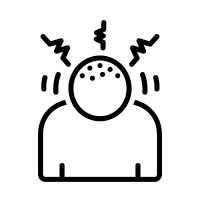Key Takeaways
- Dreams can be mental, emotional, or sensory experiences that are the result of brainwave activity while we sleep.
- There are many different types of dreams, but no exact reason why we dream, and most of them occur during REM sleep.
- Different factors can induce dreams including the foods you eat, your daily activities, and more.
Dreaming is a natural part of healthy sleep. Often the day’s events, emotions, memories, and experiences play out in our dreams as a way to cope with those feelings that linger from waking consciousness into sleep consciousness.
 What Is A Dream?
What Is A Dream?
Dreams are the result of brainwave activity while we sleep. Dreaming occurs during the deepest stage of REM sleep. There are three other stages that gradually ease you into REM sleep.
- Light sleep is the first stage. During this stage your muscles relax and your breathing and heart rate slows down.
- Deep sleep is the next stage. During this stage, your blood pressure drops, and your body begins the necessary self-repair that contributes to your physical health. Your brain waves slow down, and waking up as easily as you might during the light sleep stage becomes more difficult.
- Finally, your brain enters REM sleep. At this stage dreams begin. Your body becomes immobile. Your heart rate and breathing increase in reaction to increased brain activity during dreaming.
Types Of Dreams
Recurring dreams
Recurring dreams are similar dreams experienced on a regular basis. They may have the same themes and evoke the same emotions. Recurring dreams may be unresolved issues during waking life that are playing out at night.
Vivid dreams
Vivid dreams may feel like they are real because the imagery and experience are so vivid. They can be pleasant or frightening and may be easily recalled when you awake because they are so vivid.
Nightmares
Nightmares are terrifying dreams that may be so vivid that you awake suddenly from REM sleep. You may wake up with your heart pounding and breathing increased. Nightmares are often unresolved trauma or stress addressed by the brain during sleep.
Lucid dreams
Many people have lucid dreams that follow a storyline. The string of images or events in the dream plays out almost like a movie. Lucid dreaming is often easily recalled and may or may not be recurring. Lucid dreams are often the brain’s way of resolving an issue from waking life during sleep. The issue may be a personal problem or even something as simple as a problem at work you haven’t yet figured out. Lucid dreaming has often led the dreamer to solutions.
Fever dreams
If you are experiencing a high fever, it can cause exceptional brain activity when you sleep. Often fever dreams are very strange and intense and may or may not be easily recalled.
Why Do We Dream?
There are many theories about why we dream. The most commonly accepted scientific theory is that dreaming is a way of managing experiences from waking life, to resolve issues you are working through while awake. Dreaming may also help you address emotions you may not be confronting while awake.
Researchers already know that a good night’s sleep helps your brain reset for better mental health and allows the body to restore and repair for better physical health. But what do dreams do? They may be helping us reset and restore our emotional health from the day’s events.
How Long Do Dreams Last?
Dreamtime is illusionary. A dream can feel compressed or stretched out in time. But they do not relate to the actual time you are dreaming. Research on people dreaming has discovered that dreams can last only a few seconds or can extend for up to 20 or 30 minutes at the most. You may also sleep in and out of REM sleep and revisit a dream all night long.
Why Are Dreams So Strange?
While brain activity stimulates vivid images during dreaming, those images may not adhere to logic or sense. Without our conscious mind to define logical patterns, the brain is free to generate random images and emotions during dreaming. Brain chemicals such as dopamine and acetylcholine also increase during dreaming and play a part in producing bizarre imagery. These brain chemicals can evoke the same hallucinatory images that one may experience awake on hallucinogenic drugs or in altered mental states such as schizophrenia.
What Influences Dreams?
 Health conditions
Health conditions
Health conditions such as depression and anxiety may cause more disturbing dreams. On-going stress or unresolved traumatic experiences can trigger nightmares or unpleasant recurring dreams. Some studies even suggest that sleep disorders like sleep apnea can trigger nightmares.
 Foods
Foods
Some foods such as spicy foods or foods that cause indigestion can disturb normal sleep and may stimulate dreaming. While there is no scientific evidence that specific foods incite dreaming, often it is an individual’s reaction to a certain food that may produce dreaming as a side effect.
 Daily activities
Daily activities
Your daily activities may contribute to dreaming. If you encounter a lot of stress at work or in relationships, that stress may resurface as dreaming. Frequent dreams, especially ones conveying emotional stress, may be telling you something about your daily life.
How To Remember Your Dreams
Recalling your dream can help understand what experiences in life are causing them. Here are a few ways to take note of your dreams.
Think about your dream as soon as you wake up
Be disciplined in recalling your dream the moment you wake up. In those first few moments in the morning, your dream is still fresh in your memory and can be more easily recalled. Ask yourself, “What happened in that dream?” And be prepared to write down the details.
Have a journal or app on hand to keep track of your dream content
You can keep a journal on your nightstand to jot down the dream details when you first wake up. Also, there are apps you can use to quickly record your dreams upon waking. Be as detailed as possible when writing down the dream. Do not delay, as the dream details may slip away by the time you have had your morning coffee.
Try to wake up peacefully in the morning
When you wake up peacefully, you are more likely to sit up and bed and recall your dream as if you had just been to a movie. In a calmer state, the details will come more easily to you. And you can record those details to read and understand later in the day.
Remind yourself that dream recall is a priority
Always make your dream journal a priority. What you dream can be forgotten quickly, so maintain a dream journal discipline when you first wake in the morning. Write down the details, even if only half-awake. Be especially mindful of what you were feeling in the dream. Fear, anxiety, joy, and anger may help you better understand what your dream is about. While you may not understand your dream right away, other dreams or recurring themes in your dream over many nights may help you unlock the meaning of what your dreams are telling you.
Conclusion
If you are having trouble staying asleep at night due to dreaming or having nightmares, consider taking a sleep test to determine if you have any sleep disorders, like sleep apnea. Sleep Care Online provides an at-home sleep test that is simple to take, affordable, and convenient. If you have any questions or would like to learn more about our Complete Care package, give us a call today!








